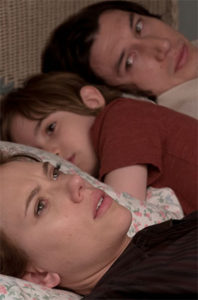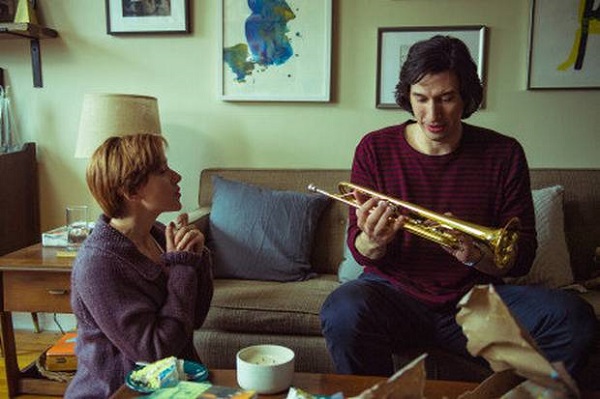
Nicole Barber (Scarlett Johannson) is, as Marriage Story depicts this slice of her life, a stage actress. As she lives her life in New York City, we hear narration from her theater director husband Charlie (Adam Driver). Here, he talks about what he loves about her, or what he hates that he loves about her. Eventually, they switch places, showing scenes in Charlie’s adult life and Nicole narration is mostly about the same things. Some of the scenes in this montage feature their son Henry (Azhy Robertson) and don’t feature each other. But the narration indicates that they know each other so much that they know how the other acts without them. This film, then, becomes what happens to that dynamic when she understandably wants to leave him.
Nicole wants to leave him partly because a production company offered her a role in a pilot. That pilot is filming in Los Angeles. And an integral part of this story is how Charlie shuffles between New York and LA and how both are acclimating to the latter. Nicole feels an initial disconnect especially with her coworkers while Charlie seems more contemptuous towards this new city. Charlie thinks that the pilot and everything is temporary and wants the family back in New York. But Nicole’s extended family lives in LA, and Baumbach plays with how Nicole an, to a certain extent, Charlie, starts to grow familial and professional roots there.
Marriage Story gets its plot from director etc. Noah Baumbach’s divorce from actress Jennifer Jason Leigh. In fictionalizing real life, Baumbach plants seeds that metastasize quickly. Like when Nicole leaves, no, drops her coat and shoes on their front door. Or Charlie’s finicky tendencies when they’re working together, or any time they play Monopoly, a game that has destroyed families for decades. Divorce is an inevitability for these good people. And he portrays that dissolution with such clarity. He has the perspective of a person who remembers the bitterness yet can laugh about the worst moments in the life of a family.
Editing also plays a major role here, like the way it shows Charlie noticing Nicole noticing his assistant Maryann (Brooke Bloom) graze his knee at a party. Or any conversation, where Baumbach plays with different dynamics. Lesser directors or lesser filmmakers will stay with a character when they’re speaking for a long time. But he interrupts those moments with a throwaway line. Or just a reaction shot to show that someone’s always listening, and that these people have their own lives and thoughts. No one behaves similarly but they all seem to belong together. Marriage Story orchestrates its scenes like exquisite set pieces.
Nicole and Charlie initially do not want to involve lawyers but they eventually do so. Baumbach gets the appropriate actors to play these lawyers. Laura Dern has made a career with two of the most feminist lines in film history, and she adds to that legacy as she plays Nicole’s lawyer, Nora Fanshawe. Matching Nora’s strength is the one coming from Charlie’s lawyers (Ray Liotta and Alan Alda). Their presence notes that point where this divorce is bigger than the two of them, that they can interpret anything they do or say in front of each other in the worst light. This fits with a theme in this year’s films where characters gain new contexts within society.
Baumbach gives ample time to spotlight his supporting cast, this is still Driver and Johannson’s film. There are things that both Baumbach and his team do to let these characters grow beyond their real life counterparts. But these two actors do the same work. Driver, playing the Baumbach stand-in, breathes life to a relate-able klutzy character. We can also see Johannson as Leigh’s stand-in but she forges a character of her own making. Together they explore the nasty sides of a divorce, adding gravitas to even the pettiest insults that they throw on each other. Most people probably know the experience of a divorce, which they evoke perfectly.
Divorce is a real life pain, one that Baumbach magnifies on the big screen, making us wonder why we even bother to fall in love if falling out of it hurts so badly. But Baumbach, again, chose to depict that the worst moments can’t destroy characters who are inherently good. Lesser filmmakers would either idealize these people or demonize them. Instead shows a tough battle between those things that make these people, fictional or otherwise, human. And in this masterwork, he chooses an ending. One that Marriage Story earns, and makes us hope that we can earn that bittersweet ending in our lives too.
For more information on Marriage Story go to https://www.tiff.net/events/marriage-story
- Release Date: 11/22/2019


